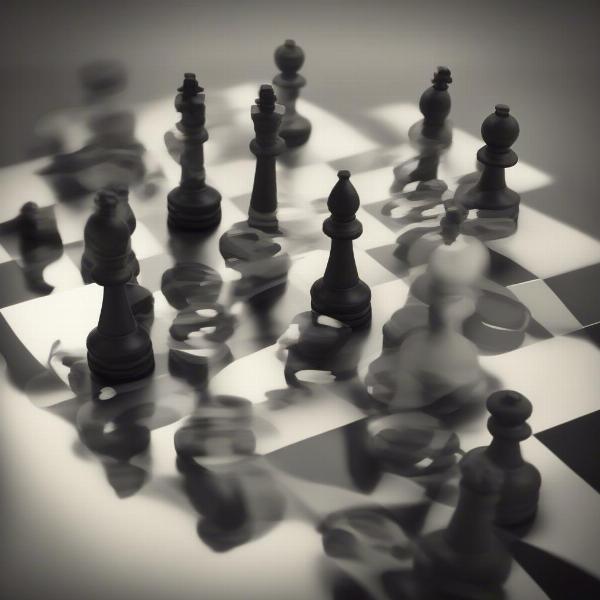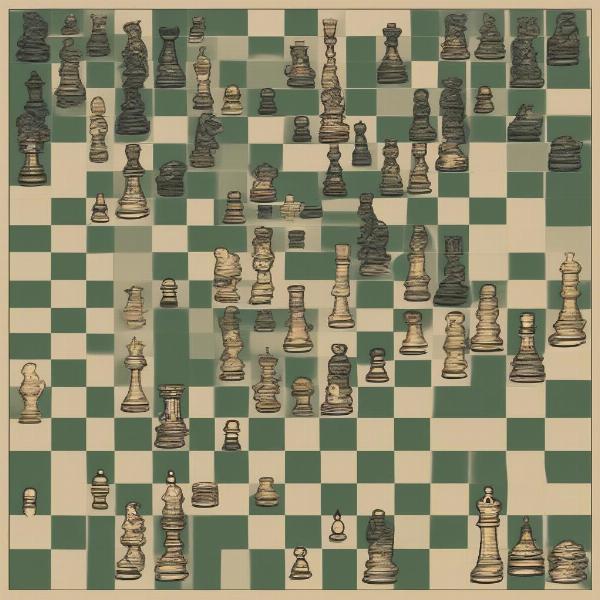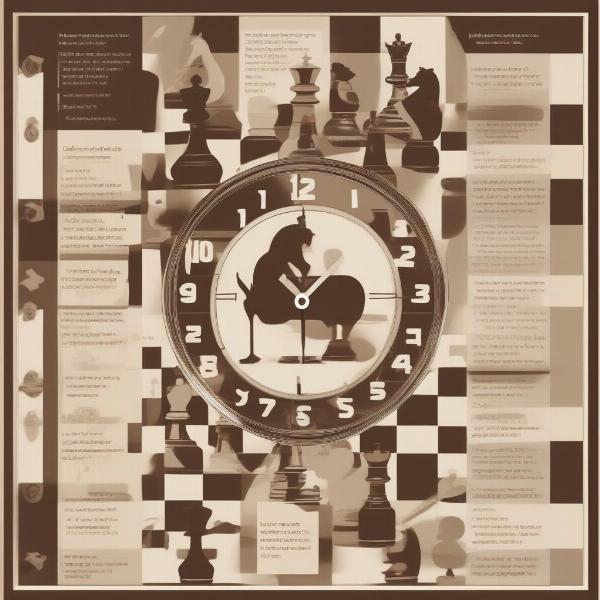Is Chess The Hardest Game? This question has plagued gamers, mathematicians, and casual players alike for centuries. The simple rules belie a depth of strategy that can take a lifetime to master. But is it truly the hardest game? Let’s delve into the fascinating world of game complexity and explore what makes a game truly challenging.
Defining Game Difficulty
What does it even mean for a game to be “hard”? Is it about mastering complex rules? Is it about the sheer number of possible moves? Or is it about the psychological challenge of outsmarting an opponent? The truth is, game difficulty is multifaceted.
Computational Complexity
From a computational perspective, games like Go and Chess possess immense complexity. The number of possible legal positions in Go is astronomically large, dwarfing even Chess. This vast search space makes it computationally challenging for even the most powerful computers to solve these games completely.
Strategic Depth
Beyond computational complexity, there’s the element of strategic depth. Chess requires players to think many moves ahead, anticipating their opponent’s responses and formulating intricate plans. This strategic depth is a significant contributor to its perceived difficulty.
Psychological Factors
The psychological aspect of games also plays a crucial role in difficulty. Chess involves psychological warfare, reading your opponent’s intentions, and exploiting their weaknesses. This mental battle adds another layer of complexity beyond the raw calculations and strategic planning.
 Chess Complexity and Strategic Depth
Chess Complexity and Strategic Depth
Comparing Chess to Other Games
How does Chess stack up against other notoriously difficult games? Let’s consider a few examples.
Go: The Ancient Challenge
Go, an ancient board game originating in China, is often considered more complex than Chess. Its simpler rules give rise to a vastly larger search space, making it incredibly challenging to master.
Poker: The Game of Incomplete Information
Poker introduces an element of incomplete information, where players must make decisions based on imperfect knowledge. This element of bluffing and deduction adds a unique layer of complexity not found in games like Chess or Go.
StarCraft: Real-Time Complexity
Real-time strategy games like StarCraft demand lightning-fast decision-making and multitasking. Players must manage resources, build armies, and execute complex strategies all under intense time pressure. This real-time element introduces a different type of difficulty compared to turn-based games like Chess.
 Go, Poker, and StarCraft: Game Complexity Comparison
Go, Poker, and StarCraft: Game Complexity Comparison
Is Chess the Hardest? The Verdict
So, is chess the hardest game? The answer, as with many things, is nuanced. While incredibly complex and strategically deep, Chess doesn’t necessarily hold the title of “hardest” across all dimensions. Games like Go offer greater computational challenges, while games like Poker introduce the intricacies of incomplete information. Ultimately, the “hardest” game depends on how you define difficulty.
Beyond the Board: Other Factors Influencing Perceived Difficulty
Several factors beyond the game itself can influence its perceived difficulty. These include:
- Skill Level of the Opponent: Playing against a grandmaster is a vastly different experience than playing against a beginner.
- Time Controls: Rapid chess introduces a time pressure element that significantly alters the game’s dynamics.
- Individual Learning Style: Some individuals may find the strategic thinking in Chess more intuitive than others.
 Chess Difficulty Factors: Opponent, Time, and Learning Style
Chess Difficulty Factors: Opponent, Time, and Learning Style
Mastering the Game: Tips for Improvement
Whether Chess is the hardest game or not, improving your skills is a rewarding journey. Here are some tips to enhance your Chess prowess:
- Study Openings: Learning standard openings provides a solid foundation for your games.
- Practice Tactics: Solving tactical puzzles sharpens your ability to spot opportunities and avoid blunders.
- Analyze Your Games: Reviewing your past games helps you identify weaknesses and improve your decision-making.
- Play Regularly: Consistent practice is essential for developing your chess skills.
Why the Fascination with Difficulty?
Why are we so drawn to the concept of the “hardest” game? Perhaps it’s the inherent human desire to challenge ourselves, to push our limits and strive for mastery. Or perhaps it’s the allure of conquering something complex and intellectually stimulating. Whatever the reason, the pursuit of game mastery is a testament to our insatiable curiosity and our drive to overcome challenges.
Conclusion
Is chess the hardest game? While undeniably challenging, it’s not the sole claimant to the title. The “hardest” game is subjective, depending on how you define difficulty. But one thing is certain: the pursuit of mastery in any game, whether Chess or another, is a journey of learning, growth, and intellectual exploration. So, pick up a game, challenge yourself, and embrace the journey. What are your thoughts? Share your perspective on the hardest game in the comments below!
FAQ
-
What is the most complex game computationally? Go is widely considered more computationally complex than Chess due to its vast search space.
-
Does Chess require a high IQ? While Chess requires strategic thinking and problem-solving skills, it doesn’t necessarily correlate directly with IQ.
-
How can I improve my Chess skills quickly? Focus on practicing tactics, studying openings, analyzing your games, and playing regularly.
-
What makes a game strategically deep? Strategic depth refers to the complexity of planning and decision-making required in a game.
-
Is Chess harder than checkers? Chess is generally considered more complex than checkers due to the greater variety of pieces and their movement capabilities.
-
What are some other challenging board games? Go, Shogi, and Arimaa are examples of other challenging board games.
-
What role does psychology play in Chess? Psychology is crucial in Chess, as it involves reading your opponent, anticipating their moves, and managing your own emotions.

